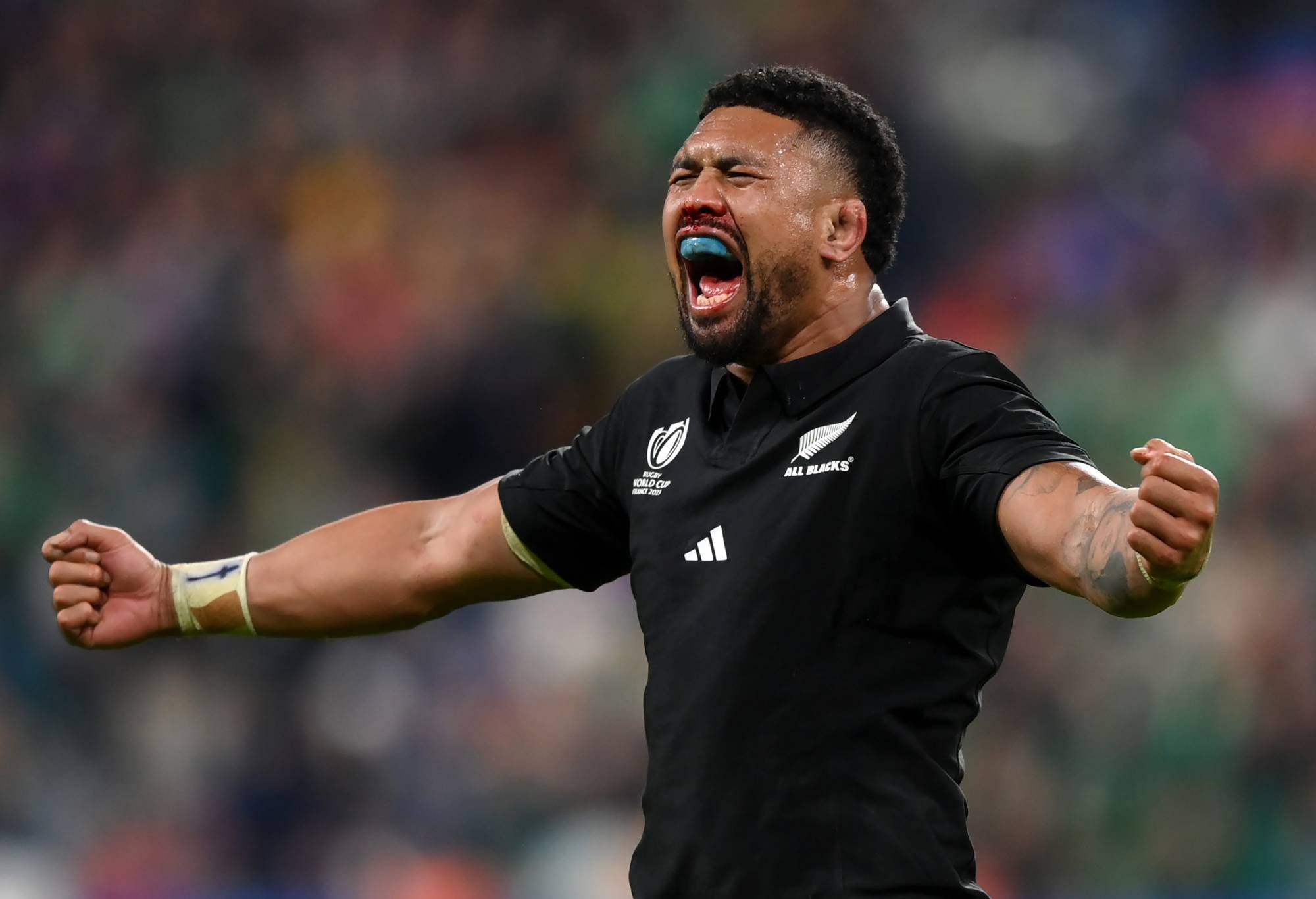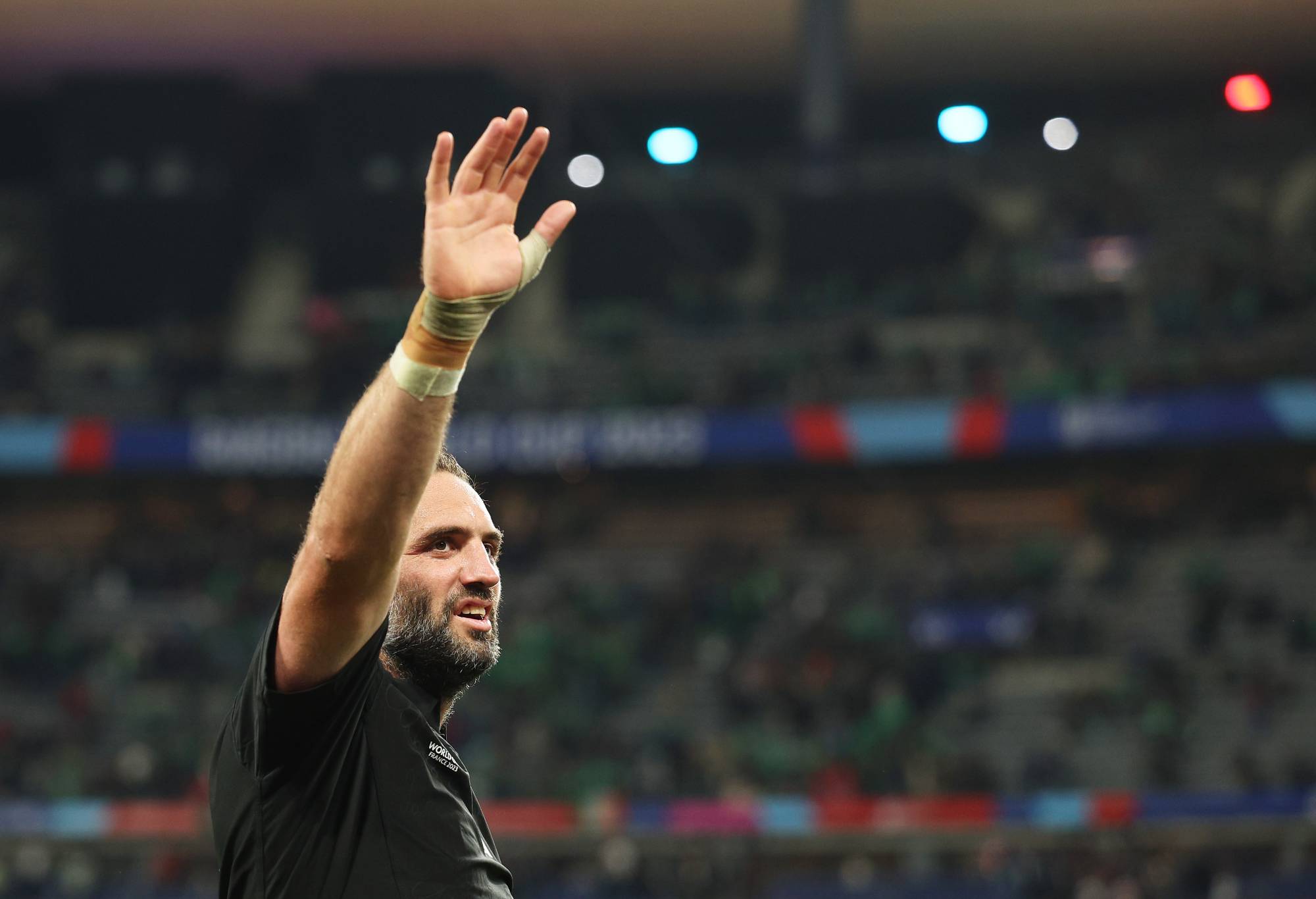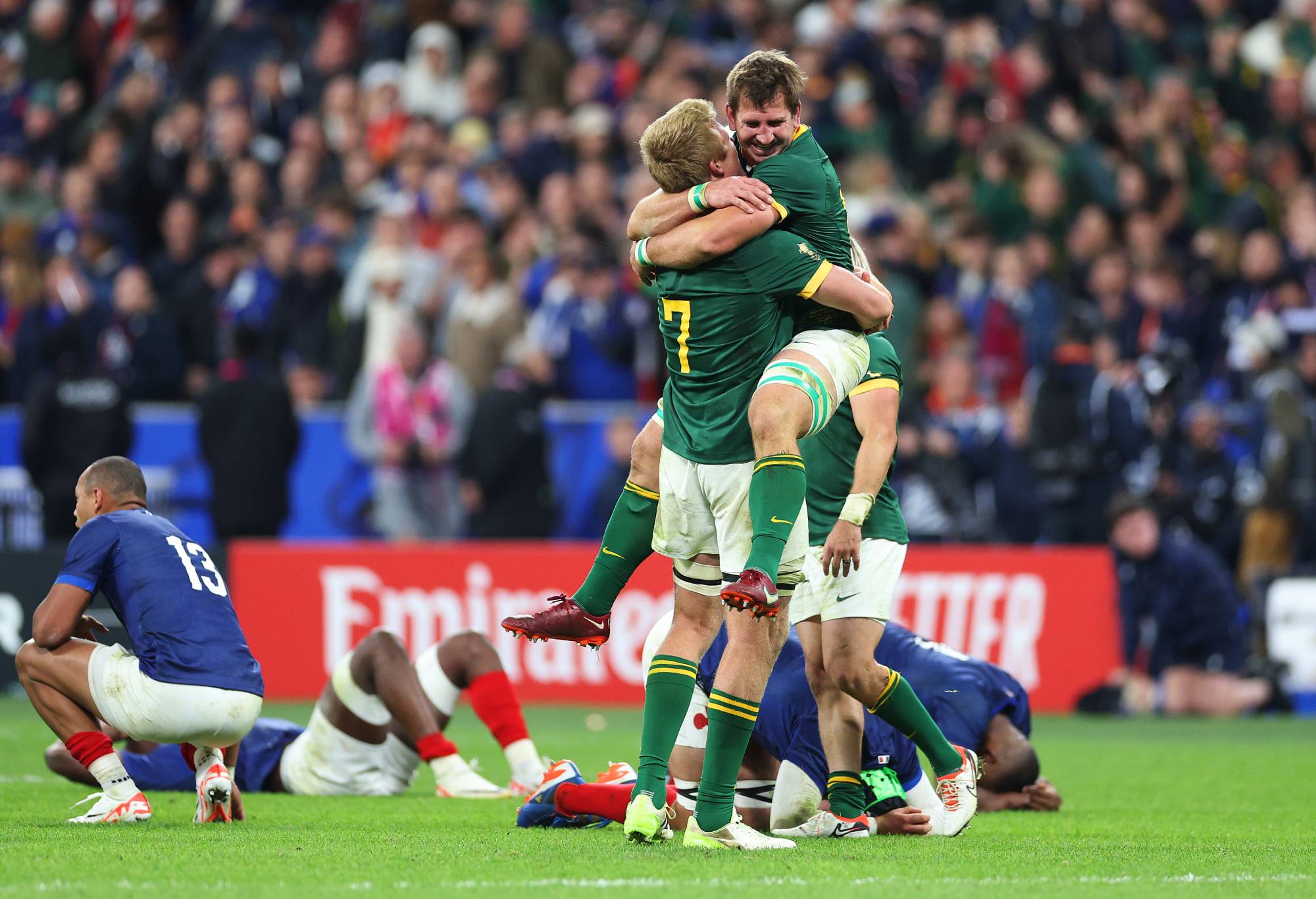There’s an iconic image which captures the conclusion of the second Test in Pretoria in 1996, where, for the first time in their history, the All Blacks defeated South Africa in a home series.
Desperately defending their goal-line as the final whistle sounded, Sean Fitzpatrick, Zinzan Brooke and Craig Dowd slumped to the ground, demonstrating the exhaustion and emotion that comes with emptying the tank at altitude, against New Zealand’s greatest rugby adversary.
Fitzpatrick would later go on to say that this was the crowning highlight of his career, eclipsing winning the World Cup in 1987. Notably, also in that 1996 squad was centre Scott McLeod, now defence coach of the All Blacks.
You can see where I’m heading with this. Repelling 37 Ireland attacking phases to secure victory, long after the 80 minutes had passed, both sides operating on little more than muscle memory and pure guts, this was Fitzpatrick’s and McLeod’s moment all over again.
Only this time it was in a World Cup, a tournament that has grown exponentially in importance and prestige, since 1987. And while New Zealand has won three, this performance, in a quarter-final against the world-ranked No.1 side on a 17-match winning tear, a side playing with verve and confidence, must rank as New Zealand’s best ever World Cup win.
Yes, there were the quarter-final thrashings of England in 1995 and France in 2015. But these were examples of a markedly superior side dishing it up to inferior opposition. There is nothing inferior about this Ireland team, and it took every last drop of energy, effort, skill and tactical nous for the All Blacks to sneak home in a match that many people expected them to lose, and most everyone else feared they would lose.
While it is the tortuous final four minutes that will live on in most minds, the seeds of victory were planted well before then.
Central to that was the All Blacks starting well, albeit after a couple of nervy early touches, including a Jordie Barrett touch-finder from a penalty that had fans wondering if Barrett thought he was playing for the NZ Warriors.
A 13-0 lead in 18 minutes meant that Ireland – terrific front runners – were always chasing the game. Never in a panicky way, but always just slightly behind the eight-ball, forced to play from a position of relative weakness, not strength.

Ardie Savea of New Zealand celebrates victory at full-time. (Photo by Justin Setterfield – World Rugby/World Rugby via Getty Images)
Another central plank was the set piece; New Zealand’s lineout impeccable, as it has been all tournament.
Accustomed to bossing the breakdown, Ireland were second best in the darkroom all night; the All Blacks consistently getting their cleaners in fast and low on their own ball, and cleverly picking their moments to pilfer Ireland’s ball.
With Ireland gradually dominating possession and territory, the All Blacks did what was absolutely necessary; they kept their error rate low, and converted opportunities when they created them, turning them into points.
No side in rugby transitions into attack like the All Blacks; the first try to Leicester Fainga’anuku, a perfect example, after Beauden Barrett had run the ball back from deep and regathered a chip kick.
The speed with which the All Blacks’ backs got into position on the left hand side, and shifted the ball into space, was breathtaking. Similarly, for Will Jordan’s try in the second half; it wasn’t so much Richie Mo’unga’s line bust, but his determination to sprint as fast and as straight as he could, and to deliver at the precise moment, that ensured his work was capitalised on.
Three moments stand out as key; all of them involving a Barrett. Earlier in his career, Beauden, upon regathering his chip, would likely have looked to throw a looping pass or a sneaky one out of the back of his hand, to a supporting player. Something flashy, all done with a cheeky smile on his face.
Here, with margins so tight, experience kicked in. Barrett took the heavy hit he knew was coming, protected the ball in the process, and the try was made.
In the context of a four-point win, no kick was more important than Jordie Barrett’s conversion of Jordan’s try; Barrett taking the ball back well beyond the 22 to open up the angle, while just having the legs to carry the crossbar.
Those two points made the difference in the final stanza, Ireland knowing they had to conjure a try, New Zealand with the relative luxury of knowing that they couldn’t be burned by a Johnny Sexton penalty or drop goal.
It was Jordie Barrett too, who got underneath Ronan Kelleher spinning out of an Ireland rolling maul that, for all money, looked like being the go-ahead score. Playing the final ten minutes with the lead reversed would have been an entirely different proposition for both teams.
Instead, Barrett got to stand up, catch his breath and launch a goal-line drop out. And in a match of so few errors, Caelan Doris dropping the restart was a huge moment.
Denied a fairytale finish to what can only be described as a stellar career, Sexton – or more specifically his aging frame – inadvertently played a role in the defeat, by confining himself to the role of link man.
Passing over 70 times and running just once, Sexton’s predictability allowed the New Zealand defenders to plug the midfield, where the hits came hard and often. New Zealand also chose not to rush into Ireland’s wrap around plays, instead letting them unfold, backing themselves to snuff out the outside runners.
They were beaten once, when Bundee Aki, whose mission to be named ‘man of the tournament’ will be cruelled by Ireland’s elimination, jagged back inside to score a wonderful try.
But for all Ireland’s possession, the All Blacks will gladly take that outcome. Even if a No.10number 10 doesn’t run often, at the least, to keep defences honest, he must always be a running threat.
As stressed as the All Blacks’ defence was at the end, they were afforded the luxury of not over-committing at the breakdown, or risking conceding an offside penalty, knowing exactly what Sexton was going to do with each recycle.
Inevitably, media reports emerged afterwards referring to Ireland’s now eight World Cup losing quarter-finals as evidence of a ‘choke’. Nothing could be further from the truth. These are the finest of margins. One great team wins, another great team loses. No more, no less.
It’s a cross that New Zealand bore for years, just as unfairly; a lazy ‘go to’ for writers who don’t fully understand the meaning of the word. (Ironically, the only time New Zealand actually choked in a World Cup was not in their unsuccessful campaigns, but when they won in 2011, seizing up in the second half of the final against France, barely falling over the finish line).
Afterwards, a sea of green washed around the stadium concourse, fans not quite sure what to do with themselves. This had felt so much like it was their time, until, all of a sudden, it wasn’t.
To a man and woman, they were generous to their side, as they should have been. As they were to the All Blacks as well. The overriding sense was that, elated or disappointed, everyone present had been part of something special.

Sam Whitelock of New Zealand acknowledges the fans . (Photo by Warren Little/Getty Images)
So, what happens from here? The popular idea that New Zealand is now on a fast track straight through to the final is deeply flawed.
There is no better team than the All Blacks at preparing under adversity – real or perceived – and pulling out huge performances under pressure. They did it in Johannesburg last year, and they did it again here.
All things equal, New Zealand is a better team than Argentina. But in the absence of that extreme pressure narrative, where there is an expectation that things will be easier, the All Blacks often struggle to deliver.
Let’s not forget that Argentina, with a calm, measured Michael Cheika coasting along in charge, and the hard-nosed leaguie David Kidwell in charge of the defence, have come up trumps twice against the All Blacks recently, in 2020 and again last year, in Christchurch.
New Zealand’s other concern is their insistence on using Beauden Barrett to play out of their 22 using shallow, contestable kicks. It nearly sold them into trouble here, twice in the second half, and if they persist, there is a sense that things will catch up with them soon.
Argentina comes to Paris having put paid to Wales 29-17, in a match where both sides seemed to clam up under the pressure of knock out rugby; cohesion and skills execution flying out the window.
Nevertheless, it was gripping stuff, put to bed only when Nico Sanchez snaffled a 77th minute intercept and scampered – not very quickly, but quickly enough – to the posts for the winning score.
The match was also notable for the early retirement, due to a leg injury, of referee Jaco Peyper. Following on from the nasty elbow injury he suffered in 2019, it’s been a tough run for Jaco at recent World Cups.
The second semi-final will be played between England and South Africa, after two vastly contrasting quarter-finals on Sunday.
If there was a World Cup for carrying on like a pork chop after winning a penalty, England’s name would already be engraved on the trophy. But somehow, they’ve navigated their way through the tournament, albeit without convincing anybody that they’re any more than functional.
Fiji got ragged early on and took too long to start playing rugby. But when they did, in pulling things back to 24-24 in the final quarter, things got really interesting.
England’s experience and superior composure got them home 30-24, but watching the different level France and South Africa operated at, it’s hard to imagine them being much more than a speed hump next week.
Back in Paris, France’s start was white hot, with Antoine Dupont right at the heart of it. But instead of being 14-0 up, after Gael Fickou held on with a man outside, then referee Ben O’Keeffe ruled in favour of Eben Etzebeth instead of a penalty try and yellow card for a slap down, all of a sudden it was 7-7 and the cut and thrust was on in earnest.

Pieter-Steph Du Toit and Kwagga Smith of South Africa celebrate victory. (Photo by Warren Little/Getty Images)
The finale echoed that of Ireland and New Zealand, but when the ball spilled forward with the French rolling into South Africa’s 22, the home side had come up a point short, 29-28. It was scarcely believable, but if anything, the pace and skill level of this match was a notch up on the night before.
But let’s not split hairs, this World Cup has been graced by four sides of the very highest quality. It seems criminal that for two of them, Ireland and France, their tournament is already over.































































































